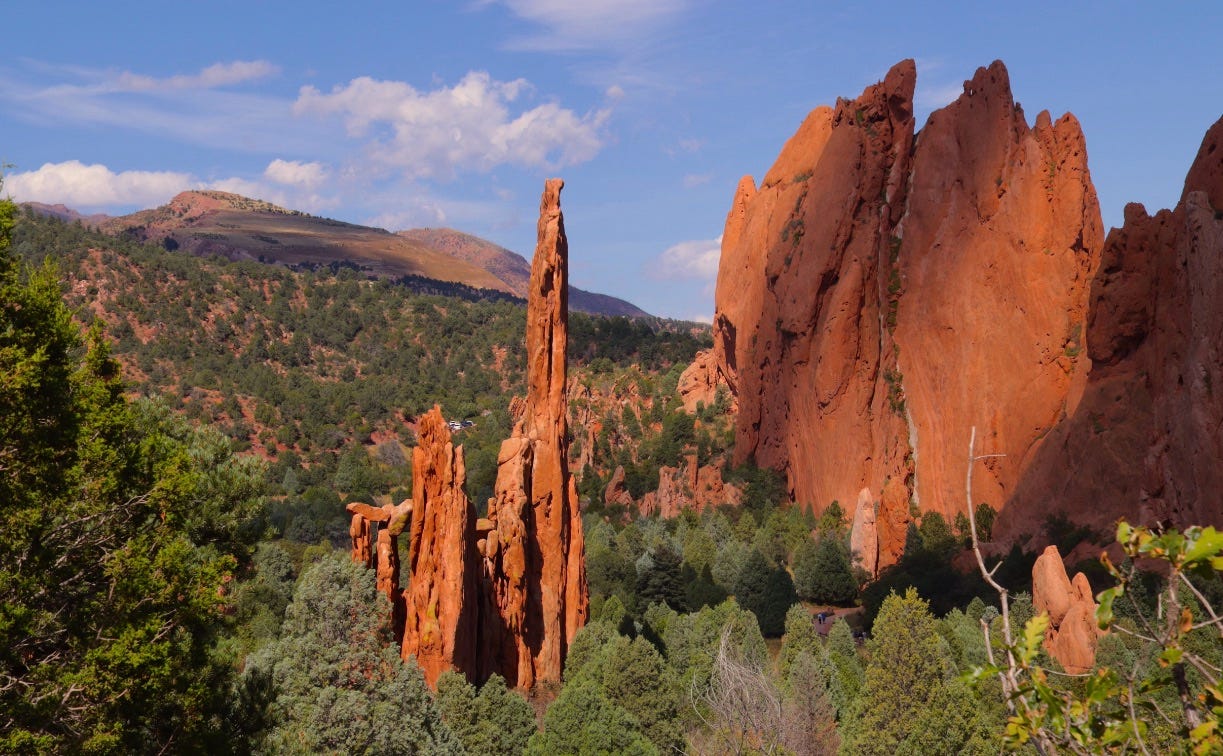Uplifted sandstone layers, reaching for the sky at the Garden of the Gods near Pikes Peak, Colorado
Sabers for their eyes
“Let me tell you, my friend, that I no longer know the taste of sleep. The bodies of children and the screams of the injured and their blood-soaked images never leave my sight. The cries of mothers and the wailing of men who are missing their loved ones never fade from my hearing…I am tired, my friend.” Al-Jazeera journalist Ismail-al-Ghoul, shortly before his targeted assassination by Israel Defense Forces in late July.
Last week the international Committee to Protect Journalists updated its body count of reporters killed since October 7th in the war in Gaza. It put the number at “at least 113 journalists” and reported it is continuing to investigate hundreds of other cases. Other media organizations put the number considerably higher.
Ismail al-Ghoul’s death was especially gruesome. He was beheaded by the force of the missile blast on his car, an explosion that also instantly killed his Al-Jazeera partner, Rami-al-Rifi and a bystander, Khalid Shawa, a boy on bicycle, at the Al-Shati refugee camp in Gaza. Both al-Ghoul and al-Rifi were wearing armored vests with the word “PRESS” in large print inscribed on them.
Ismail-al-Ghoul
But that mattered not. According to the Reuters international news agency, the Israeli Defense Forces acknowledged the attack on al-Ghoul and al-Rifi’s vehicle and defended the action by accusing al-Ghoul of being a Hamas operative who’d participated in the October 7, 2023 attack on Israel. (Al-Jazeera and al-Ghoul’s family vehemently denied the accusations.) In its headline even Reuters highlighted that the IDF had made the charges against al-Ghoul “without evidence.” In its report on al-Ghoul’s assassination, the CPJ noted, as had Al-Jazeera, that al-Ghoul had been in Israeli custody for more than 12 hours last March before being released. It begged the question of why—if there was evidence of al-Ghoul’s association with Hamas and the Oct. 7 attacks—he’d been released by the IDF. The IDF made no such charges against al-Rifi.
The brutal killings of al-Ghoul and al-Rifi are all too common in Gaza, prompting numerous warnings and protests from CPJ and other international organizations advocating for the safety of reporters and calling for prosecutions for what appear to be deliberately targeted assassinations. Earlier this year, a panel of five experts engaged by the United Nations to examine the alarming death toll among journalists in Gaza, issued a scathing report.
In addition to deploring “the extraordinarily high numbers of journalists and media workers who have been killed, attacked, injured and detained in the Occupied Palestinian Territory, particularly in Gaza, in recent months,” the panel implicated Israeli defense forces in“blatantly disregarding international law.” It concluded its report by urging the international judicial institutions “to give particular attention to the dangerous pattern of attacks and impunity for crimes against journalists.”
As a fellow journalist and parent, the details of these despicable killings are wrenching. The legendary stress Ismail-al-Ghoul endured in his courageous reporting was deepened by his dislocation from his family, due to the strife of the war. Last October, the renowned Al-Jazeera broadcast journalist Wael Al-Dahdouh lost his wife, daughter, grandson and other relatives to an Israeli bombing attack. Just a few months later, in early January of this year, his son Hamza—a fellow Al-Jazeera journalist—was killed along with a freelance videographer in an Israeli drone strike on his car. Al-Dahdouh’s grief is painfully imaginable, and the injustice is deeply troubling.
Because of the entry restraints on western journalists, the eyes of journalism in Gaza are Palestinian eyes, to bear witness not just to the Israeli bombardments and assaults, but to the role of U.S. arms in this gruesome and unending siege. I write this not to minimize the tens of thousands of other civilian deaths, injuries, and deprivations, but to underscore a value we dare not overlook—the importance of protecting journalists who risk their safety reporting from war zones, to prevent them from being intimidated and killed so as to place atrocities out of sight, and the carnage of warfare out of mind. It is all the more important when our government’s policies are implicated in the crimes, and our dollars are flowing to those who commit them.
—tjc










